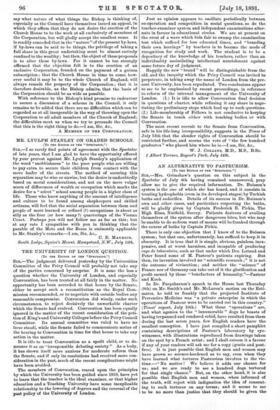THE UNIVERSITY OF LONDON QUESTION.
[To THZ EDITOR OP THE " SPECTATOR:1 Sin,—The judgment delivered yesterday by the Universities Committee of the Privy Council will probably not take any of the parties concerned by surprise. It is none the less a question whether the University of London, and especially Convocation, has been treated at all fairly in the matter. No opportunity has been accorded to that house by the Senate, either to accept such a reconstitution as the Royal Com- mission recommended, or to negotiate with outside bodies any reasonable compromise. Convocation did wisely, under such circumstances, to reject decisively the unworkable charter which the Senate had evolved. Convocation has been equally ignored in the matter of the recent consideration of the peti- tion of King's and University Colleges before the Privy Council Committee. Its annual committee was ruled to have no locus standi, while the Senate failed to communicate notice of the hearing to Convocation in time for that house to take any action in the matter.
It is idle to treat Convocation as a spoilt child, or to de- nounce it as an "irresponsible debating society." As a body, it has shown itself more anxious for moderate reform than the Senate, and if only its resolutions had received more con- sideration in the past, much of the recent complications might have been avoided.
The members of Convocation, reared upon the principles by which the University has been guided since 1858, have yet to learn that the teacher is the ideal examiner, or that higher education and a Teaching University have some inexplicable relationship to the lowering of degrees and the reversal of the past policy of the University of London.
Just as opinion appears to oscillate periodically between co-operation and competition in social questions, so do the teacher-examiner system and independent examinations alter- nate in favour in educational circles. We are at present on the crest of a wave which bids fair to swamp the examination test which sufficed for less educated times, and "branding their own herrings" by teachers is to become the mode of recognition for study and work. The student is to be a depositary of the knowledge of his teachers, rather than an individuality assimilating intellectual nourishment against some future day of judgment.
Happily the new " brand" will be distinguishable from the old, and the inequity which the Privy Council was invited to perpetrate, in taking away the name of London from the pre- sent University, has been repudiated. Two conclusions appear to me to be emphasised by recent proceedings, in reference to reform of the internal management of the University of London. (1.) It is idle to allow Convocation final decision in questions of charter, while refusing it any share in nego- tiating the preliminary steps which lead up to such questions. (2.) Life-membership of Fellows is not conducive to keeping the Senate in touch either with teaching bodies or with. Convocation.
The most recent recruit to the Senate from Convocation, safe in his life-long irresponsibility, suggests in the Times of July 13th that the slender rights of Convocation should be restricted further, and scorns the vote of " the few hundred graduates " who placed him where he is.—I am, Sir, &c.,


















































 Previous page
Previous page